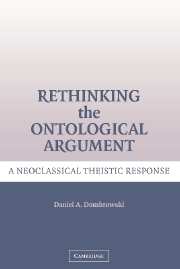Book contents
- Frontmatter
- Contents
- Acknowledgments
- Introduction
- 1 Historical Background
- 2 Poetry versus the Ontological Argument: Richard Rorty's Challenge
- 3 Deconstructionism and the Ontological Argument: The Case of Mark Taylor
- 4 Is the Ontological Argument Worthless? Graham Oppy's Rejection
- 5 Oppy, Perfect Islands, and Existence as a Predicate
- 6 Rival Concepts of God and the Ontological Argument: Thomas Morris, Katherin Rogers, and Alvin Plantinga
- Bibliography
- Index
5 - Oppy, Perfect Islands, and Existence as a Predicate
Published online by Cambridge University Press: 16 July 2009
- Frontmatter
- Contents
- Acknowledgments
- Introduction
- 1 Historical Background
- 2 Poetry versus the Ontological Argument: Richard Rorty's Challenge
- 3 Deconstructionism and the Ontological Argument: The Case of Mark Taylor
- 4 Is the Ontological Argument Worthless? Graham Oppy's Rejection
- 5 Oppy, Perfect Islands, and Existence as a Predicate
- 6 Rival Concepts of God and the Ontological Argument: Thomas Morris, Katherin Rogers, and Alvin Plantinga
- Bibliography
- Index
Summary
In the previous chapter on Graham Oppy's important book, I tried to deal forthrightly with a standard objection to the ontological argument, reiterated by Oppy, that the ontological argument involves inappropriate talk about a necessary being. If only propositions can be necessary, it is alleged, then the ontological argument is (at least virtually) worthless. The following sort of response makes sense: even if necessity is applied only to propositions, the ontological argument shows that the proposition that “God's existence cannot be contingent” is true at all times and hence the argument is anything but worthless (cf. Purtill 1966, 406). Regardless of whether we take necessity to be de dictu or de re or both, however, it should be noted that there is no incompatibility between the conclusion of the ontological argument and the reported(contingent) empirical evidence of religious experience. As before, different strands of evidence can mutually reinforce each other (Johnson 1977).
The purpose of the present chapter, however, is to respond in greater detail to two familiar concerns of Oppy and other critics of the ontological argument: the perfect island objection made famous by Gaunilo and echoed in similar contemporary parody objections, on the one hand, and the existence is not a predicate objection made famous by Kant and found in similar contemporary objections, on the other. Oppy predictably supports parodies of the ontological argument, but he is surprisingly skeptical regarding existence is not a predicate objections.
- Type
- Chapter
- Information
- Rethinking the Ontological ArgumentA Neoclassical Theistic Response, pp. 110 - 128Publisher: Cambridge University PressPrint publication year: 2006



